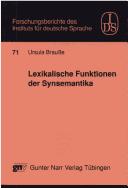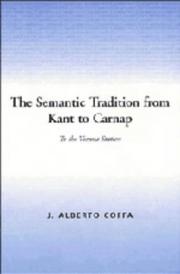| Listing 1 - 4 of 4 |
Sort by
|
Book
ISBN: 0691066965 1322005982 0691609780 1400858542 9781400858545 9780691066967 9780691609782 Year: 1987 Publisher: Princeton (N.J.): Princeton university press,
Abstract | Keywords | Export | Availability | Bookmark
 Loading...
Loading...Choose an application
- Reference Manager
- EndNote
- RefWorks (Direct export to RefWorks)
Exploring the status of the semantic unit in recent linguistic and literary theories--the sign itself--Richard Waswo relates present-day literary concerns to Renaissance thought about the connections between language and meaning.Originally published in 1987.The Princeton Legacy Library uses the latest print-on-demand technology to again make available previously out-of-print books from the distinguished backlist of Princeton University Press. These editions preserve the original texts of these important books while presenting them in durable paperback and hardcover editions. The goal of the Princeton Legacy Library is to vastly increase access to the rich scholarly heritage found in the thousands of books published by Princeton University Press since its founding in 1905.
Lexicology. Semantics --- Philosophy of language --- anno 1400-1499 --- anno 1500-1599 --- Semantics --- Language and languages --- Renaissance --- History --- Philosophy --- -Semantics --- -Renaissance --- Revival of letters --- Civilization --- History, Modern --- Civilization, Medieval --- Civilization, Modern --- Humanism --- Middle Ages --- Formal semantics --- Semasiology --- Semiology (Semantics) --- Comparative linguistics --- Information theory --- Lexicology --- Meaning (Psychology) --- Foreign languages --- Languages --- Anthropology --- Communication --- Ethnology --- Philology --- Linguistics --- Renaissance. --- History. --- Philosophy. --- Semantics - History --- Language and languages - Philosophy
Book
ISBN: 9789052013848 9052013845 Year: 2008 Volume: 1 Publisher: Bruxelles: Peter Lang,
Abstract | Keywords | Export | Availability | Bookmark
 Loading...
Loading...Choose an application
- Reference Manager
- EndNote
- RefWorks (Direct export to RefWorks)
Lexicology. Semantics --- Semantics --- Semantiek --- Sémantique --- Sémasiologie --- History --- Breal, Michel, --- History. --- #KVHA:Taalkunde --- #KVHA:Semantiek --- #KVHA:Bréal, Michel --- Formal semantics --- Semasiology --- Semiology (Semantics) --- Comparative linguistics --- Information theory --- Language and languages --- Lexicology --- Meaning (Psychology) --- Bréal, Michel, --- Bréal, M. --- Bréal, Michel Jules Alfred, --- Bréal, Michel --- Semantics - History --- Breal, Michel, - 1832-1915

ISBN: 3823348353 9783823348351 Year: 1994 Volume: 71 Publisher: Tübingen: Narr,
Abstract | Keywords | Export | Availability | Bookmark
 Loading...
Loading...Choose an application
- Reference Manager
- EndNote
- RefWorks (Direct export to RefWorks)
Lexicology. Semantics --- German language --- Semantics --- Grammar, Comparative and general --- Context (Linguistics) --- History --- Syntax --- -German language --- -Grammar, Comparative and general --- -Semantics --- -Formal semantics --- Semasiology --- Semiology (Semantics) --- Comparative linguistics --- Information theory --- Language and languages --- Lexicology --- Meaning (Psychology) --- Comparative grammar --- Grammar --- Grammar, Philosophical --- Grammar, Universal --- Philosophical grammar --- Linguistics --- Philology --- Ashkenazic German language --- Hochdeutsch --- Judaeo-German language (German) --- Judendeutsch language --- Judeo-German language (German) --- Jüdisch-Deutsch language --- Jüdischdeutsch language --- Germanic languages --- Situation (Linguistics) --- Grammar, Comparative --- Context --- Semantics. --- Syntax. --- History. --- Context (Linguistics). --- Formal semantics --- Semantics - History --- Grammar, Comparative and general - Syntax --- German language - Semantics --- German language - Syntax --- Grammar, Comparative and general Syntax

ISBN: 0521374294 0521447070 1139172247 Year: 1991 Publisher: Cambridge New York Cambridge University Press
Abstract | Keywords | Export | Availability | Bookmark
 Loading...
Loading...Choose an application
- Reference Manager
- EndNote
- RefWorks (Direct export to RefWorks)
This major publication is a history of the semantic tradition in philosophy from the early nineteenth century through its incarnation in the work of the Vienna Circle, the group of logical positivists that emerged in the years 1925-1935 in Vienna who were characterised by a strong commitment to empiricism, a high regard for science, and a conviction that modern logic is the primary tool of analytic philosophy. In the first part of the book, Alberto Coffa traces the roots of logical positivism in a semantic tradition that arose in opposition to Kant's theory that a priori knowledge is based on pure intuition and the constitutive powers of the mind. In Part II, Coffa chronicles the development of this tradition by members and associates of the Vienna Circle. Much of Coffa's analysis draws on the unpublished notes and correspondence of many philosophers. The book, however, is not merely a history of the semantic tradition from Kant 'to the Vienna Station'. Coffa also critically reassesses the role of semantic notions in understanding the ground of a priori knowledge and its relation to empirical knowledge and questions the turn the tradition has taken since Vienna.
Semantics --- Vienna circle --- Viennese circle --- Wiener Kreis --- Philosophers --- Logical positivism --- Formal semantics --- Semasiology --- Semiology (Semantics) --- Comparative linguistics --- Information theory --- Language and languages --- Lexicology --- Meaning (Psychology) --- History --- Bolzano, Bernard, --- Frege, Gottlob, --- Kant, Immanuel --- Frege, G. --- Fu-lei-ko, --- Frege, Friedrich Gottlob, --- פרגה, גוטלוב, --- Frege, Friedrich Ludwig Gottlob, --- Kant, Emmanuel --- Kant, Emanuel --- Kant, Emanuele --- Vienna circle. --- History. --- Kant, Immanuel, --- Sémantique --- Cercle de Vienne --- Histoire --- Contributions in semantics --- Et la sémantique --- Bolzano, Bernard --- Frege, Gottlob --- Semantics - History. --- Kant, Immanuel, 1724-1804 - Contributions in semantics. --- Bolzano, Bernard, 1781-1848 Contributions in semantics. --- Frege, Gottlob, 1848-1925 - Contributions in semantics. --- Contributions in semantics. --- Kant, I. --- Kānt, ʻAmmānūʼīl, --- Kant, Immanouel, --- Kant, Immanuil, --- Kʻantʻŭ, --- Kant, --- Kant, Emmanuel, --- Ḳanṭ, ʻImanuʼel, --- Kant, E., --- Kant, Emanuel, --- Cantơ, I., --- Kant, Emanuele, --- Kant, Im. --- קאנט --- קאנט, א. --- קאנט, עמנואל --- קאנט, עמנואל, --- קאנט, ע. --- קנט --- קנט, עמנואל --- קנט, עמנואל, --- كانت ، ايمانوئل --- كنت، إمانويل، --- カントイマニユエル, --- Kangde, --- 康德, --- Kanṭ, Īmānwīl, --- كانط، إيمانويل --- Kant, Manuel, --- Bolzano, Bernardus Placidus Johann Nepomuk --- Arts and Humanities --- Language & Linguistics
| Listing 1 - 4 of 4 |
Sort by
|

 Search
Search Feedback
Feedback About UniCat
About UniCat  Help
Help News
News